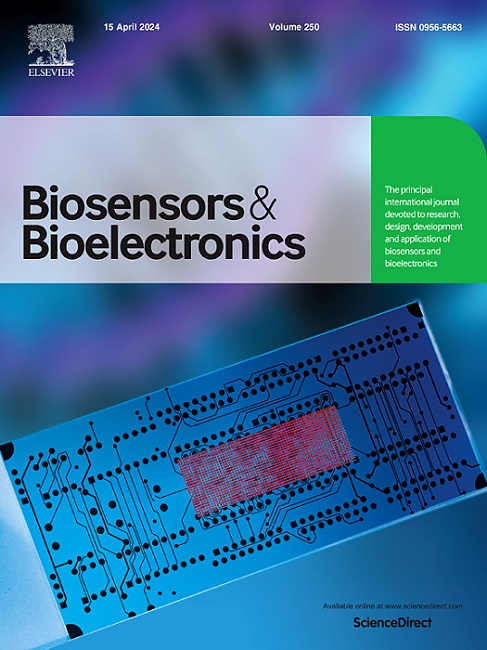通过基于心肌细胞的慢性动态生物传感平台检测能量应激诱导的心脏自噬。
IF 10.7
1区 生物学
Q1 BIOPHYSICS
引用次数: 0
摘要
低血糖是糖尿病治疗过程中常见的并发症,与心血管事件密切相关。血糖突然降低会增加心律失常的风险,从而导致心脏性猝死。这一事件通常伴随着心肌细胞异常的电生理活动。然而,传统模型无法大规模、高通量地有效反映各种葡萄糖剥夺条件下心肌细胞的实时电生理变化。因此,我们需要开发一种新的生物传感平台来辅助相关的科学研究。本研究开发了一种基于心肌细胞的生物传感器,用于实时、无创地监测心肌细胞在不同葡萄糖浓度下的电生理反应。研究结果表明,低血糖条件会导致心肌细胞电生理学异常,但自噬能使细胞在这种逆境中存活下来。抑制自噬会加剧电生理异常,长期葡萄糖饥饿会对心肌细胞造成不可逆的损伤。所提出的基于心肌细胞的慢性动态生物传感平台为了解低血糖对基于心肌细胞的体外心脏模型的影响提供了一种新工具,揭示了自噬有可能成为糖尿病和低血糖的替代治疗方法。本文章由计算机程序翻译,如有差异,请以英文原文为准。
Energy stress induced cardiac autophagy detection via a chronic and dynamic cardiomyocytes-based biosensing platform
Hypoglycemia is a common complication which occurs during the treatment of diabetes, closely associated with cardiovascular events. A sudden decrease in blood glucose increases the risk of arrhythmia, which can lead to sudden cardiac death. This event is usually accompanied by abnormal electrophysiological activities in cardiomyocytes. However, traditional models do not efficiently reflect real-time cardiomyocyte electrophysiological changes under various glucose deprivation conditions in a large-scale and high-throughput manner. Therefore, we need to develop a new biosensing platform to aid in related scientific research. In this study, a cardiomyocyte-based biosensor was developed for real-time, noninvasive monitoring of the electrophysiological responses of cardiomyocytes under different glucose concentrations. The findings show that low-glucose conditions result in abnormal electrophysiology in cardiomyocytes, but autophagy enables cells to survive this adversity. Inhibition of autophagy exacerbates electrophysiological abnormalities, and long-term glucose starvation causes irreversible damage to cardiomyocytes. The proposed chronic and dynamic cardiomyocyte-based biosensing platform provides a new tool for understanding the effects of hypoglycemia on the in vitro cardiomyocyte-based heart model, revealing that autophagy has the potential to be an alternative treatment for diabetes and hypoglycemia.
求助全文
通过发布文献求助,成功后即可免费获取论文全文。
去求助
来源期刊

Biosensors and Bioelectronics
工程技术-电化学
CiteScore
20.80
自引率
7.10%
发文量
1006
审稿时长
29 days
期刊介绍:
Biosensors & Bioelectronics, along with its open access companion journal Biosensors & Bioelectronics: X, is the leading international publication in the field of biosensors and bioelectronics. It covers research, design, development, and application of biosensors, which are analytical devices incorporating biological materials with physicochemical transducers. These devices, including sensors, DNA chips, electronic noses, and lab-on-a-chip, produce digital signals proportional to specific analytes. Examples include immunosensors and enzyme-based biosensors, applied in various fields such as medicine, environmental monitoring, and food industry. The journal also focuses on molecular and supramolecular structures for enhancing device performance.
 求助内容:
求助内容: 应助结果提醒方式:
应助结果提醒方式:


